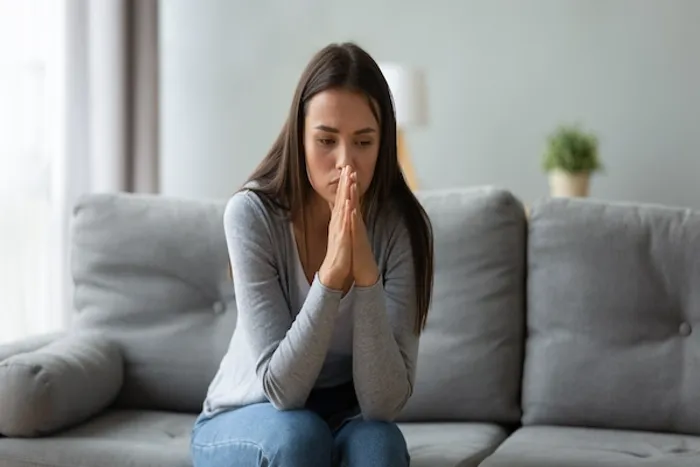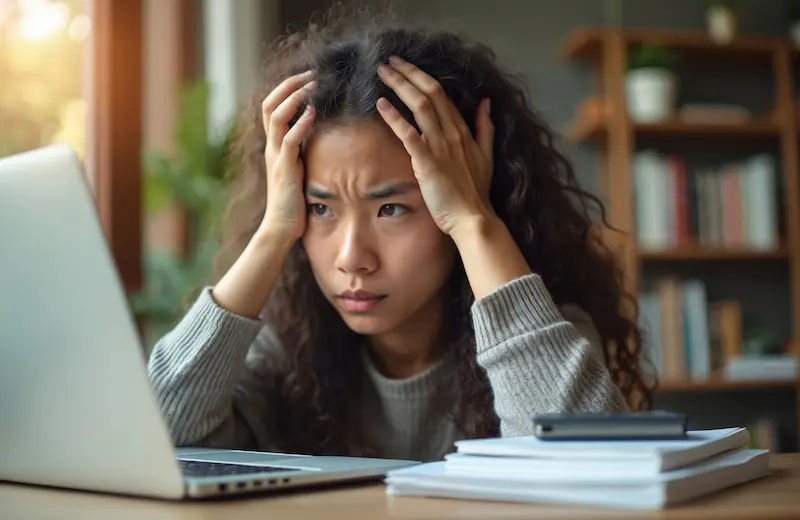Best Home Remedies to Reduce Anxiety Naturally
Discover science-backed anxiety remedies you can try at home: breathing, sleep, movement, mindfulness, and when to seek help. Simple, safe tips.

Written by Dr. Mohammed Kamran
Reviewed by Dr. Dhankecha Mayank Dineshbhai MBBS
Last updated on 13th Jan, 2026

Introduction
Feeling anxious from time to time is part of being human, but when worry or tension lingers, it can drain your energy, sleep, and focus. The good news: small, practical changes can calm your nervous system and support your mental health. In this guide, you’ll find simple anxiety remedies backed by reputable health organizations, plus everyday steps for stress relief you can start today. You’ll also learn when it’s time to reach out for professional support.
Important note: These suggestions are educational and not a substitute for care from a licensed clinician. If anxiety is severe, persistent, or you’re thinking about harming yourself, seek professional help right away.
Simple anxiety remedies you can try today
These quick strategies can be done at home or anywhere you feel on edge.
Breathe low and slow (diaphragmatic breathing)
Many people breathe shallowly into the chest when anxious, which can keep the body in “alert” mode. Belly breathing signals your body to settle.
Try this:
- or lie comfortably. Place one hand on your chest and one on your belly.
- Inhale through your nose for 4 seconds, letting your belly rise more than your chest.
- Pause briefly.
- Exhale gently through pursed lips for 6 seconds, letting the belly fall.
- Repeat for 2–5 minutes. Aim for smooth, easy breaths rather than forceful ones.
Why it helps: Slow diaphragmatic breathing can reduce physical symptoms of anxiety like rapid heartbeat and muscle tension and supports the body’s relaxation response.
Ground yourself with your senses (5–4–3–2–1)
- This technique helps when racing thoughts take over.
- Look for 5 things you can see.
- Notice 4 things you can feel (clothing, chair, feet on floor).
- Listen for 3 sounds.
- Identify 2 things you can smell.
- Name 1 thing you can taste (or take a sip of water).
This anchors attention in the present moment and can reduce spirals of worry.
Progressive muscle relaxation
- Tension often hides in the jaw, shoulders, hands, or stomach. Progressive muscle relaxation teaches your body the contrast between tight and relaxed.
- Start with your feet. Gently tense the muscles for 5 seconds (no pain), then release for 10–15 seconds.
- Move up through calves, thighs, hips, abdomen, hands, arms, shoulders, neck, and face.
- Keep breathing slowly as you go.
Practicing regularly makes it easier to notice and release tension during the day.
Gentle movement: a brisk walk or stretch
- Physical activity is a reliable mood lifter for many people. A 10–20 minute walk, light cycling, or stretching can help your body use up excess adrenaline and increase a sense of steadiness.
- Over time, regular activity supports better sleep and mood regulation.
- Cool water splash or temperature shift
- A quick splash of cool water on your face or holding a cool pack to your cheeks for 30–60 seconds can activate the body’s calming reflex. If you’re sensitive to cold, use lukewarm water and breathe slowly instead.
Consult a Top General Physician
Quick, science-backed steps for stress relief at home
The habits below build a strong foundation for calmer days and more restorative nights.
Prioritize sleep routine
- Sleep and anxiety affect each other in both directions. Helpful steps:
- Keep a consistent sleep and wake time, even on weekends.
- Wind down 30–60 minutes before bed: dim lights, read, or listen to calm audio.
- Keep your bedroom dark, quiet, and cool.
- Limit large meals and heavy exercise close to bedtime.
- Reduce caffeine after midday if it interferes with sleep.
Most adults benefit from 7–9 hours of sleep; teens and children need more.
Be caffeine, nicotine, and alcohol smart
- Caffeine: Coffee, energy drinks, and strong tea can worsen jitters and sleep issues. Consider cutting back or switching to lower-caffeine options.
- Nicotine: It’s a stimulant and can heighten anxiety despite feeling calming in the moment. If you use tobacco or nicotine products and want to quit, talk to a clinician about support options.
- Alcohol: It may feel relaxing at first but often leads to fragmented sleep and rebound anxiety the next day. Try alcohol-free days to see how you feel.
Move regularly
Regular physical activity supports mood and overall health. A common goal for adults is at least 150 minutes of moderate-intensity activity per week (for example, brisk walking), plus muscle-strengthening activities on 2 or more days. Start small if you’re new to activity—every bit counts.
Nourish your body consistently
Stable energy helps steady your mood. Tips:
- Eat regular meals with protein, fiber, and healthy fats to avoid blood sugar dips that can feel like anxiety.
- Favor whole foods when you can: vegetables, fruits, legumes, whole grains, nuts, seeds, fish, and lean proteins.
- Drink water throughout the day; dehydration can worsen headaches and fatigue.
Research on specific “anti-anxiety diets” is still evolving, but many people notice fewer dips in mood with balanced, regular meals.
Connect with others
Talking with a trusted friend, family member, or support group can ease worry and reduce isolation. Even brief, positive social contact—like a short call or a walk with a neighbor—can help your nervous system feel safer.
Time outdoors and light exposure
Natural light during the morning and time in green spaces can help regulate your body clock and mood. If going outside isn’t possible, open curtains or sit near a bright window during the day.
Mind-body practices that calm the nervous system
Mindfulness meditation
Mindfulness trains you to notice thoughts and feelings without getting swept away by them.
- Consistent practice is key.
- Start with 5 minutes a day. Sit comfortably, focus on your breath or a simple phrase.
- When your mind wanders (and it will), gently return to your focus without judgment.
- Consider short guided practices through reputable apps or health-system videos.
Studies suggest mindfulness-based programs can reduce anxiety symptoms and improve coping skills.
Yoga or tai chi
- These gentle movement practices combine breath, posture, and attention. Many beginners find slow, restorative styles especially calming. Look for beginner classes (in person or online) and move within a comfortable range.
Journaling and “worry time”
- Journaling: Spend 5–10 minutes writing down worries, then write one small, doable step for each concern—or note that it’s currently out of your control.
- Scheduled worry time: Set a 10–15 minute daily window to list worries. Outside that window, when worry pops up, gently tell yourself, “I’ll save this for my worry time.” This helps contain rumination.
Teas, aromatherapy, and supplements: what to know?
- Herbal teas (such as chamomile) and lavender aromatherapy are soothing for some people and generally low risk for most adults. However, herbs can interact with medicines and may not be safe in pregnancy or for certain conditions. If you have allergies, are pregnant, or take medications (especially blood thinners, sedatives, or antidepressants), check with a clinician first.
- Supplements: Evidence for many “calming” supplements is limited or mixed. Some products can cause side effects or interact with medications. For example, kava has been linked to rare but serious liver problems. Always consult a healthcare professional before starting any supplement, and avoid using supplements as a substitute for proven treatments.
A gentle 7-day plan to try
Use this as a flexible guide—adjust based on your needs and health advice.
- Day 1: Learn belly breathing. Practice 5 minutes in the morning and again at bedtime.
- Day 2: Add a 15-minute walk or light yoga. Note your mood before and after.
- Day 3: Reduce afternoon caffeine. Swap to water or herbal tea after lunch.
- Day 4: Create a 30-minute wind-down routine: dim lights, stretch, read, or listen to calming audio.
- Day 5: Try progressive muscle relaxation in the evening (10–15 minutes).
- Day 6: Practice 5 minutes of mindfulness meditation. Set a timer and sit comfortably.
- Day 7: Connect with someone supportive (call, text, or meet for a short walk). Review your week, and choose 2–3 habits to keep.
Tip: Stack habits. For example, practice belly breathing right after brushing your teeth, or meditate after your morning coffee/tea (or decaf).
When to seek more support?
Home strategies are helpful, but professional care makes a real difference for many people.
Consider reaching out to a clinician or mental health professional if:
- Anxiety is frequent, intense, or interferes with work, school, relationships, or sleep.
- You experience panic attacks, persistent restlessness, or avoidance that limits your life.
- You’re using alcohol, cannabis, or other substances to cope.
- You have a history of trauma and symptoms feel overwhelming.
- You think about harming yourself or feel you’re unsafe.
If you’re in immediate danger or at risk of harming yourself or others, contact local emergency services or a crisis line available in your country right away.
Consult a Top General Physician
Consult a Top General Physician

Dr. Rajib Ghose
General Physician/ Internal Medicine Specialist
25 Years • MBBS
East Midnapore
VIVEKANANDA SEBA SADAN, East Midnapore

Dr. Swaroopa Rani
General Physician/ Internal Medicine Specialist
9 Years • MBBS, MD (Internal Medicine)
Bengaluru
Apollo Medical Center, Marathahalli, Bengaluru

Dr. Utsa Basu
Diabetologist
14 Years • MBBS , MD
Barasat
Diab-Eat-Ease, Barasat
(75+ Patients)

Dr. Anindita Mondal
General Physician/ Internal Medicine Specialist
8 Years • MBBS
Kolkata
VDC Clinic, Kolkata

Dr. Tamal Bhattacharyya
Pulmonology Respiratory Medicine Specialist
8 Years • MBBS, MD (Respiratory Medicine)
Kolkata
MCR SUPER SPECIALITY POLY CLINIC & PATHOLOGY, Kolkata
Consult a Top General Physician

Dr. Rajib Ghose
General Physician/ Internal Medicine Specialist
25 Years • MBBS
East Midnapore
VIVEKANANDA SEBA SADAN, East Midnapore

Dr. Swaroopa Rani
General Physician/ Internal Medicine Specialist
9 Years • MBBS, MD (Internal Medicine)
Bengaluru
Apollo Medical Center, Marathahalli, Bengaluru

Dr. Utsa Basu
Diabetologist
14 Years • MBBS , MD
Barasat
Diab-Eat-Ease, Barasat
(75+ Patients)

Dr. Anindita Mondal
General Physician/ Internal Medicine Specialist
8 Years • MBBS
Kolkata
VDC Clinic, Kolkata

Dr. Tamal Bhattacharyya
Pulmonology Respiratory Medicine Specialist
8 Years • MBBS, MD (Respiratory Medicine)
Kolkata
MCR SUPER SPECIALITY POLY CLINIC & PATHOLOGY, Kolkata
More articles from Anxiety disorders
Frequently Asked Questions
What is the fastest way to calm down during a wave of anxiety?
A brief reset often helps: slow belly breathing for a few minutes, the 5–4–3–2–1 grounding technique, stepping outside for fresh air, or splashing cool water on your face. If you can, move your body (a quick walk or gentle stretches).
Can diet changes reduce anxiety?
There’s no single “anxiety diet,” but steady energy helps. Many people feel better with regular, balanced meals, plenty of fiber-rich foods, lean proteins, and healthy fats. Limiting excess caffeine and alcohol can also help. If you have specific nutrition questions or health conditions, consult a registered dietitian.
Are supplements safe for anxiety?
Some may help certain people, but evidence is mixed, and supplements can interact with medications or cause side effects. Because quality varies among products, talk with a healthcare professional before starting any supplement. Do not stop prescribed medications without medical guidance.
How much exercise helps with anxious feelings?
A common goal for adults is at least 150 minutes of moderate-intensity activity (like brisk walking) per week, plus muscle-strengthening on 2 or more days. If that feels like a lot, begin with 5–10 minutes a day and build up—consistency matters more than perfection.
When should I see a therapist or doctor about anxiety?
Seek help if anxiety persists for weeks, affects your daily life, or you have panic attacks, trouble sleeping, or you’re using substances to cope. If you have thoughts of self-harm or feel unsafe, seek immediate help.




